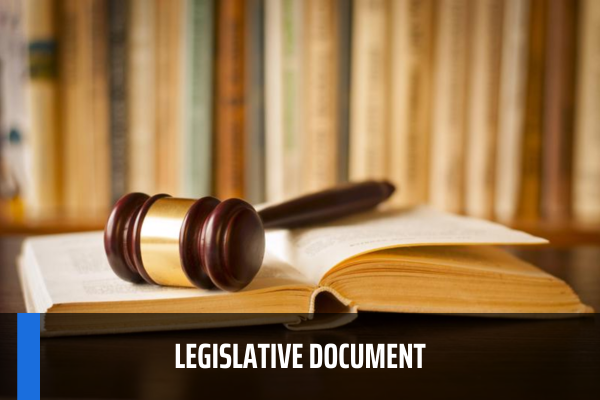Is the ordinance a legislative document in Vietnam? What are the purposes of ordinances in Vietnam?
What is an ordinance? Is the ordinance a legislative document in Vietnam?
Pursuant to Clause 3, Article 4 of the Law on promulgation of legislative documents 2015 (amended and supplemented by Points a and b, Clause 1, Article 1 of the Law on Amendments to the Law on Promulgation of Legislative Documents 2020), it is stipulated as follows :
The system of legislative documents
1. The Constitution.
2. Codes and Laws (hereinafter referred to as Laws), Resolutions of the National Assembly
3. Ordinances, Resolutions of the Standing Committee of the National Assembly; Joint Resolutions between the Standing Committee of the National Assembly and the Management Board of Central Committee of Vietnamese Fatherland Front; Joint Resolutions between the Standing Committee of the National Assembly, the Government, the Management Board of Central Committee of Vietnamese Fatherland Front
4. Orders, Decisions of the President.
5. Decrees of the Government; Joint Resolutions between the Government and Management Board of Central Committee of Vietnamese Fatherland Front
6. Decision of the Prime Minister.
7. Resolutions of Judge Council of the People’s Supreme Court.
8. Circulars of the Executive Judge of the People’s Supreme Court; Circulars of the Chief Procurator of the Supreme People’s Procuracy; Circulars of Ministers, Heads of ministerial agencies; Decisions of the State Auditor General.
8a. Joint Circulars between the Executive Judge of the People’s Supreme Court, the Chief Procurator of the Supreme People’s Procuracy, the State Auditor General, Ministers, Heads of ministerial agencies. Joint Circulars between Ministers and Heads of ministerial agencies shall not be promulgated.
9. Resolutions of the People’s Councils of central-affiliated cities and provinces (hereinafter referred to as provinces).
10. Decisions of the People’s Committees of provinces.
11. Legislative documents of local governments in administrative - economic units.
12. Resolutions of the People’s Councils of districts, towns and cities within provinces (hereinafter referred to as districts).
13. Decisions of the People’s Committees of districts.
14. Resolutions of the People’s Councils of communes, wards and towns within districts (hereinafter referred to as communes).
15. Decisions of the People’s Committees of communes.
Accordingly, the Ordinance promulgated by the National Assembly Standing Committee is a legislative documents in the system of legislative documents.

Is the ordinance a legislative document in Vietnam? What are the purposes of ordinances in Vietnam?
What are the purposes of ordinances in Vietnam?
According to Clause 1, Article 16 of the Law on promulgation of legislative documents 2015, it is stipulated as follows:
Ordinances and resolutions of Standing Committee of the National Assembly
1. Standing Committee of the National Assembly shall promulgate ordinances to decide the issues assigned by the National Assembly.
2. Standing Committee of the National Assembly shall promulgate resolutions to prescribe:
a) Explain the Constitution, laws, and ordinances;
b) Suspend or extend the implementation period of the whole or part of an ordinance or resolution promulgated by Standing Committee of the National Assembly to meet urgent requirements for socio-economic development;
c) Annul ordinances and resolutions promulgated by Standing Committee of the National Assembly; in case an ordinance is annulled, Standing Committee of the National Assembly must submit a report to the National Assembly at the nearest meeting;
d) Declare full or partial mobilization; declare, cancel states of emergency nationwide or locally;
dd) Provide instructions on operation of the People’s Councils;
e) Decide other issues within the competence of Standing Committee of the National Assembly.
Accordingly, the National Assembly Standing Committee promulgates ordinances to regulate issues assigned by the National Assembly.
Who has the authority to promulgate ordinances in Vietnam according to current law?
According to Article 88 of the Constitution 2013, it is stipulated as follows:
The President has the following tasks and powers:
1. To promulgate the Constitution, laws and ordinances; to request the Standing Committee of the National Assembly to reconsider its ordinances, within ten days of their passage; if those ordinances are still voted for by the Standing Committee of the National Assembly and disapproved by the President, the President shall refer the matter to the National Assembly for decision at its next session;
2. To propose to the National Assembly to elect, relieve from duty or remove from office the Vice President or Prime Minister; and, based on resolutions of the National Assembly, to appoint, relieve from duty or dismiss Deputy Prime Ministers, Ministers or other members of the Government;
3. To propose the National Assembly to elect, relieve from duty or remove from office the Chief Justice of the Supreme People's Court or Procurator General of the Supreme People's Procuracy; and, based on resolutions of the National Assembly, to appoint, relieve from duty or dismiss Judges of the Supreme People's Court; to appoint, relieve from duty or dismiss Deputy Chief Justices of the Supreme People's Court, Judges of other Courts or Deputy Procurators General or Procurators of the Supreme People's Procuracy; to decide on a special amnesty; or, based on resolutions of the National Assembly, to proclaim a general amnesty;
...
Accordingly, the President is the person with the authority to promulgate the ordinance and request the Standing Committee of the National Assembly to reconsider its ordinances, within ten days of their passage; if those ordinances are still voted for by the Standing Committee of the National Assembly and disapproved by the President, the President shall refer the matter to the National Assembly for decision at its next session;
LawNet